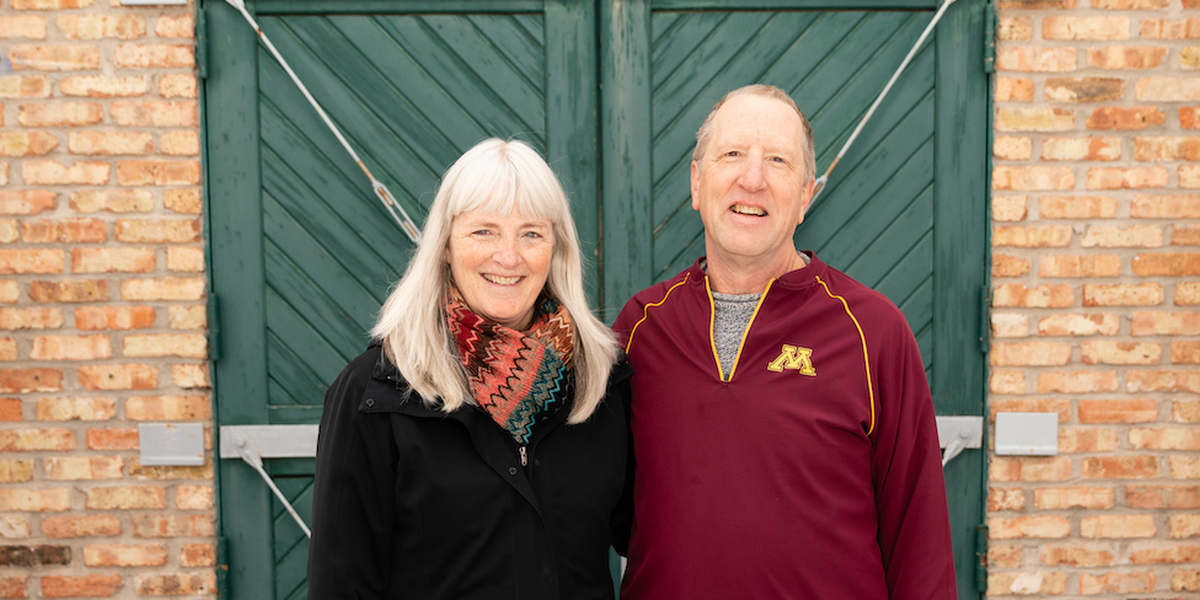
The College of Biological Sciences has changed since CBS Steering Committee members Cheryl Quinn (BS Biochemistry and Microbiology ’85) and Robert Buck (BS Biology ’82) were accepted to the University of Minnesota several decades ago. At that time, freshmen could not enroll in CBS. There was no Nature of Life series to help new students build a CBS community. Students didn’t enter the college until their sophomore or junior years.
When Cheryl came to campus in fall 1980, she had planned to major in humanities. “It never entered my mind that I wanted to be a scientist. If I was going to be a scientist, I think everyone thought I would be an engineer because I liked taking things apart and putting things back together,” she said. But after taking an introductory biology class, she thought, “ ‘I like this. I’m going to look into this field.’ It was challenging and mentally stimulating.”
Bob started out in the Institute of Technology (now CSE) in 1977. That was his parents’ idea, he said, but he knew he wanted to go into biology. When the two met at a friend’s wedding just after Quinn’s freshman year, Bob was enrolled in CBS. “It was really nice to get into CBS,” he said. “The St. Paul campus back then was very small and remote; it gave you the opportunity to be part of a small school but have all the resources available of the large school.”
After graduating in 1982, Buck worked at Cedar Creek Ecosystem Science Reserve for two years with director David Tilman. There, he constructed Tilman’s database for the LTER project. After Cheryl graduated from the U in 1985, she and Bob—who married in September 1982—moved on to the University of Illinois Urbana-Champaign, where Cheryl received a PhD in biochemistry and Bob received an MS in statistics.
Next stop: England. Bob received a PhD in statistics at City, University of London and Cheryl did her postdoctoral work in molecular immunology at the University of Oxford. On weekends, they explored the British countryside on hikes with friends, a pastime they’ve carried through their lives, as they traversed careers and now retirement. They have returned to England often to visit friends and to continue their walking tours of the country. The couple are avid travelers and birders. Some of their favorite travel experiences have been watching hummingbirds in the tropics and searching for the Wandering Tattler on a long hike in Denali National Park & Preserve in Alaska (which they finally did spot near a bus stop at the end of the hike).
Over the course of his career, Bob taught at Western Michigan University, held several positions in biostatistics at Pfizer Corporation and launched his own firm, StatAnswers Consulting. Cheryl had an extensive career in the pharmaceuticals and biotechnology industries, including serving as CEO of ImmuVen, Inc., a T-cell receptor-based technology company. Though both are technically retired, Cheryl is an active reviewer for the National Institutes of Health and serves on the editorial board of Applied and Environmental Microbiology. Bob still does some consulting.
CBS gave Cheryl and Bob a home both in their undergraduate years and now, as well as “a baseline for what could be,” Bob said. “I’ve always appreciated that.” In 2004, the couple established the Robert J. Buck and Cheryl L. Quinn Scholarship for high-achieving CBS students with financial need.
Cheryl, who was raised in Robbinsdale and Brooklyn Center, Minn., is a first-generation college student. Though her dad, a welder, and mother, a bookkeeper, did not attend college, she said that “from the time we were babies, it wasn’t, ‘Are you going to college?’; it was, ‘You are going to college. How are you going to pay for it?’ ”
Bob grew up in St. Louis Park, Minn. His mother received a B.S. in Child Welfare from the U in the 1940s and was a teacher. His father received his engineering degree much later, in 1967. Bob attended his father’s graduation that year, and about 15 years later, he got to see his father graduate again, when the elder Buck received his MBA.
Now, they see students entering college as being much more on a career track than they were. “When we meet these students who get our scholarship: wow,” Cheryl said. “They are so articulate; they are so knowledgeable. They are already so experienced, and some of them come first-generation, like I was.”
Supporting their alma mater in their home state is important. “Today, you can see how important having a solid university system can be—to have that expertise and knowledge right here in your backyard,” Bob said. “The University has shown itself [during the COVID-19 pandemic], but there are experts on practically anything you can think of at the university. We have that resource right here in Minnesota and it’s such a fantastic thing to have in this state.” – Kristal Leebrick